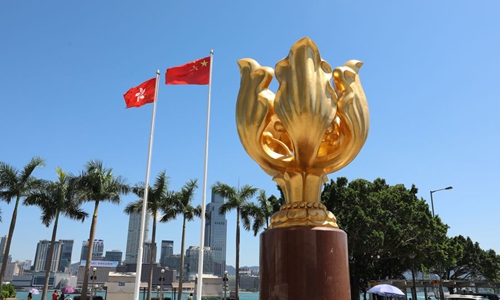Greater Bay Area could designate sites to house HK residents: DAB
Source:Global Times Published: 2020/5/19 21:58:35

Photo taken on Aug. 5, 2019 shows China's national flag and the flag of the Hong Kong Special Administrative Region on the Golden Bauhinia Square in Hong Kong, South China. (Xinhua/Wu Xiaochu)
The Guangdong-Hong Kong-Macao Greater Bay Area could consider creating two landfill sites in South China's Guangdong Province for new housing, mainly for Hong Kong residents, according to attendees of the upcoming two sessions from the Hong Kong Special Administrative Region (HKSAR).
The brainstorm, part of the attendees' wide-reaching motions and proposals to be submitted to the annual legislative and political advisory sessions beginning on Thursday, intends to capitalize on the vibrant Bay Area to revitalize Hong Kong's economy, which has taken a battering from the COVID-19 pandemic and local riots.
The HKSAR's economy shrank 8.9 percent year-on-year in real terms in the first quarter, its biggest contraction since the first quarter of 1974 when quarterly numbers became available, official data showed.
National People's Congress (NPC) deputies and members of the National Committee of the Chinese People's Political Consultative Conference (CPPCC) from the pro-establishment Democratic Alliance for the Betterment and Progress of Hong Kong (DAB) will bring up the idea of building a "Hong Kong town" in the territorial waters on the south side of the Zhuhai section of the Hong Kong-Zhuhai-Macao Bridge and Zhuhai's Guishan Island, read a copy of the motions and proposals obtained by the Global Times.
The first site for an outlying unit of Hong Kong enclosed in Zhuhai is a 30-minute drive from the Hong Kong International Airport and a mere five-minute drive from the Zhuhai and Macao ports. If the central government and HKSAR government reach an agreement, technological evaluation and landfill work could be completed within five years.
The other site, one of the major islands in Zhuhai, is geographically close to Hong Kong's commercial centers including Central and Tsim Sha Tsui.
If the project is approved, at least 10 square kilometers of undeveloped land can be expected from each site, and if the two sites are to serve residential needs, 160,000-200,000 units will be provided, doing much to address the city's housing issue, the DAB NPC deputies and CPPCC members estimated.
Additionally, they suggested the opening of more cutting-edge science and technology infrastructure, and the provision of crucial instruments for Hong Kong, enabling the city's researchers to rely on the national strength to make more achievements.
A push for development of the insurance sector and the creation of a unified property information platform in the Greater Bay Area, and plans to integrate the city's businesses and think tanks into the national drive for the Belt and Road Initiative, are also among the DAB members' propositions.
On top of that, Witman Hung Wai-man, a Hong Kong deputy to the NPC and principal liaison officer for Hong Kong of the Shenzhen Qianhai Authority, proposed the establishment of a special "data zone" in Shenzhen's Qianhai to explore ways to improve data property and privacy protection.
The new establishment can allow for sensitive data including healthcare big data to be stored in the special zone. Businesses and research institutions, including Hong Kong agencies, could set up operations in Qianhai, Hung said in his motions sent to the Global Times.
Read-only original data could not leave the special zone while research results could be transmitted out, advised Hung, an information and communications technology veteran and angel investor.
Global Times
Posted in: ECONOMY,FOCUS右